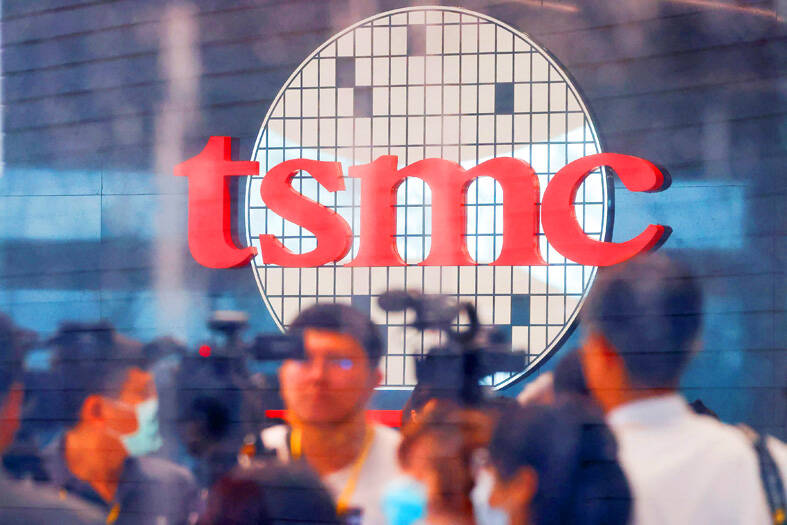Taiwan Semiconductor Manufacturing Co (TSMC, 台積電) retained the title of No. 1 invention patent applicant in the country in the first half of this year, according to the Intellectual Property Office of the Ministry of Economic Affairs.
In addition to topping the list of Taiwanese companies, TSMC was also ahead of all foreign applicants in the six-month period, the office said in a report issued late last month.
Data compiled by the office showed TSMC filed 1,171 invention patent applications, up 1 percent from a year earlier, making the chipmaker the largest invention patent applicant in Taiwan for the seventh year in a row.

Photo: Ann Wang / Reuters
Among foreign companies, South Korean tech giant Samsung Electronics Co was the top invention patent applicant, filing 430 applications in the first half of the year, a 48 percent rise from a year earlier, the data showed.
Under Taiwan's law, patents are categorized into three groups — invention, utility model and design — and invention patents are considered the most important in terms of developing new technology.
The office said artificial intelligence (AI) development led to an increase in high-performance computing applications, which pushed up demand for TSMC’s high-end processes and led the company to seek more invention patents.
After TSMC, smartphone IC designer MediaTek Inc (聯發科) came in second after filing 321 invention patents in the six-month period, the highest level for the company and up 114 percent from a year earlier, followed by flat-panel maker AUO Corp (友達) with, 228, up 3 percent, DRAM chip supplier Nanya Technology Corp (南亞科技) with 219, down 12 percent, and flat-panel supplier Innolux Corp (群創) with 181, up 1 percent.
The office said the increase in invention patent applications from MediaTek, Innolux and Inventec Corp (英業達) provided more evidence that AI development had fueled the increase.
Following Samsung, US semiconductor equipment supplier Applied Materials Inc took the second spot among foreign applicants after filing 341 invention patents in the six-month period, down 22 percent from a year earlier, ahead of US smartphone IC designer Qualcomm Inc, with 316, down 22 percent, Japanese electrical product maker Nitto Denko Corp with 254, up 10 percent, and Japan-based semiconductor supplier Tokyo Electron Ltd with 249, down 8 percent.
The office said this was the first time that Samsung had filed more than 400 invention patents in Taiwan.
In the first half of this year, a total of 24,256 invention patents were filed, down 0.2 percent from a year earlier, with 9,390 of them from local entities, up 0.4 percent, and 14,866 from foreign entities, down 1 percent from a year earlier, the data showed.
In terms of trademarks, food brand Uni-President Enterprises Corp (統一企業) was the largest local applicant in the first half of this year after filing 239 applications, while China-based automaker SAIC-GM-Wuling Automobile Co (上汽通用五菱汽車) was the top foreign trademark applicant in Taiwan with 84 applications, the office said.

Nvidia Corp chief executive officer Jensen Huang (黃仁勳) on Monday introduced the company’s latest supercomputer platform, featuring six new chips made by Taiwan Semiconductor Manufacturing Co (TSMC, 台積電), saying that it is now “in full production.” “If Vera Rubin is going to be in time for this year, it must be in production by now, and so, today I can tell you that Vera Rubin is in full production,” Huang said during his keynote speech at CES in Las Vegas. The rollout of six concurrent chips for Vera Rubin — the company’s next-generation artificial intelligence (AI) computing platform — marks a strategic

Enhanced tax credits that have helped reduce the cost of health insurance for the vast majority of US Affordable Care Act enrollees expired on Jan.1, cementing higher health costs for millions of Americans at the start of the new year. Democrats forced a 43-day US government shutdown over the issue. Moderate Republicans called for a solution to save their political aspirations this year. US President Donald Trump floated a way out, only to back off after conservative backlash. In the end, no one’s efforts were enough to save the subsidies before their expiration date. A US House of Representatives vote

REVENUE PERFORMANCE: Cloud and network products, and electronic components saw strong increases, while smart consumer electronics and computing products fell Hon Hai Precision Industry Co (鴻海精密) yesterday posted 26.51 percent quarterly growth in revenue for last quarter to NT$2.6 trillion (US$82.44 billion), the strongest on record for the period and above expectations, but the company forecast a slight revenue dip this quarter due to seasonal factors. On an annual basis, revenue last quarter grew 22.07 percent, the company said. Analysts on average estimated about NT$2.4 trillion increase. Hon Hai, which assembles servers for Nvidia Corp and iPhones for Apple Inc, is expanding its capacity in the US, adding artificial intelligence (AI) server production in Wisconsin and Texas, where it operates established campuses. This

US President Donald Trump on Friday blocked US photonics firm HieFo Corp’s US$3 million acquisition of assets in New Jersey-based aerospace and defense specialist Emcore Corp, citing national security and China-related concerns. In an order released by the White House, Trump said HieFo was “controlled by a citizen of the People’s Republic of China” and that its 2024 acquisition of Emcore’s businesses led the US president to believe that it might “take action that threatens to impair the national security of the United States.” The order did not name the person or detail Trump’s concerns. “The Transaction is hereby prohibited,”